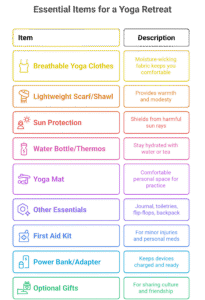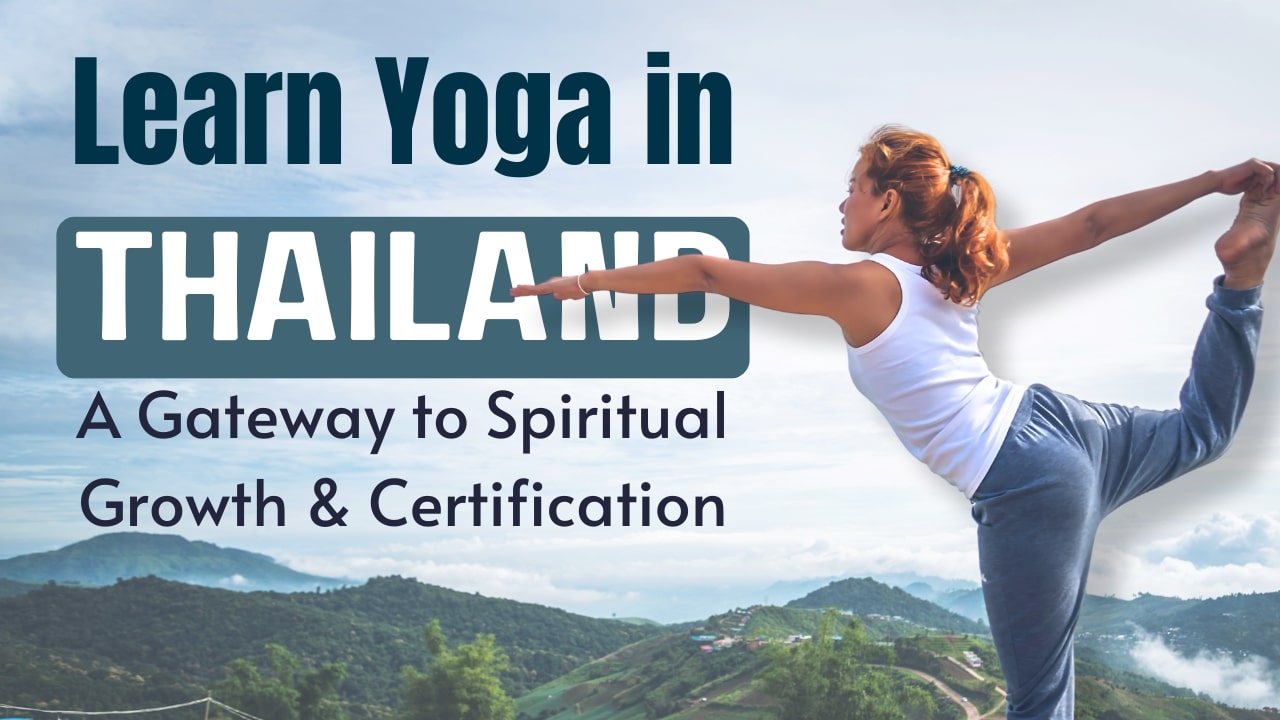Why Thailand Is a Dream Destination for Yoga Enthusiasts
Many people want to improve their yoga skills or become qualified yoga teachers. Thailand is one of the best places in the world to do both. Thailand is both beautiful and spiritual. You can find a calm yoga vacation or a tough yoga training in Thailand. Either way, the atmosphere is meant to help you relax, connect, and grow, both inside and out.
Thailand is different not only because of its beauty but also because of its balance. Along with yoga, meditation, and conscious movement, traditional Thai healing, Buddhist philosophy, and living in the present moment all fit together easily. You’ll find a unique mix of old customs and new wellness culture here, which helps to learn yoga in Thailand.
Thailand is also a great place to do yoga for a lot less money than places like Bali or Europe. From the friendly locals to the helpful yoga groups, this place has a soft warmth that makes you feel at home, even if you’ve never been outside of your home country. Thailand yoga is more than just a vacation for people who want to clear their minds, grow, or take a helpful break from their everyday lives. It’s a powerful way to start changing yourself.
Top Yoga Retreat Destinations in Thailand
Thailand offers something special for every type of yoga student, whether they want deep inner work, a beautiful place, or to find the balance between the energy of the city and mindful stillness. Here are three of the popular yoga places in Thailand that help you feel good about yourself:
Yoga in Koh Phangan—Island Bliss
If you’re dreaming of the island where time slows down and healing starts, then yoga Thailand Koh Phangan will be the best choice for you. This island is known for its world-class yoga centres. It’s a place for spiritual growth and wellness, and not just a place to party.
This will help you focus on detox, immersion, creation, and renewal. The area is perfect for letting go of old habits and reconnecting with yourself with its peaceful and green jungle.
Yoga in Koh Samui—Jungle, Beach & Wellness
People who want to be comfortable and aware at the same time, yoga in Thailand, Koh Samui, offers the best of both. This island has boutique yoga resorts and luxury wellness centres, which are located hidden in a tranquil jungle or right next to the beach.
Start your day here with a dynamic morning flow class, then an organic plant-based lunch, swim in the ocean, and meditate at sunset. This place is perfect for you if you want to relax, get fit, and practice your spirituality all in one.
Yoga in Bangkok—City & Spiritual Contrast
Yoga in Bangkok gives both modern energy and ancient wisdom together if you want a more urban vibe. This city is designed for busy lives and curious minds and is filled with various yoga centers, day retreats, and short workshops.
You can go deep into your breath and stillness while practicing yoga in Bangkok, while the world whispers outside. This place is perfect for travellers who want to stay connected to yoga without leaving the city behind.
Becoming a Certified Yoga Teacher in Thailand
Your journey as a certified yoga teacher in Thailand can be one of the most inspiring places to begin with if you are dreaming of sharing yoga with others or want to deepen your personal practice. Thailand has world-class programs, natural surroundings and a deeply spiritual atmosphere, which makes many youths choose it for their training.
200-Hour Yoga Thailand Teacher Training
The most common place to start is with a 200-Hour yoga teacher training school in Thailand. It’s made for the people who want to become teachers and those who just want to learn more about yoga.
During the next three to four weeks, you’ll dive into:
- Every day, Asana ( Postures) practice in hatha, Vinyasa, or a mix of the two.
- Yoga theory from old books like the Yoga Sutras and the Bhagavad Gita
- Anatomy and alignment will help you learn how to move safely.
- Pranayama, meditation, and mantra chanting
- Methods of teaching—by the end of the course, you’ll be able to run your classes.
Most of the programs in Thailand are approved by the Yoga Alliance. This means that once you finish your training, you can register as an RYT-200 and teach all over the world. It’s not just an award; for many, it was a turning point in their lives that changed everything.
300-Hour & Specialty Trainings
You may feel called to learn more after your 200-hour study is over. It makes sense to go to Thailand for the 300-hour yoga teacher training. You can improve your voice as a teacher, learn more, and try out deeper healing methods in these advanced trainings.
Some examples of speciality schools are:
- Yoga for Prenatal and Postnatal
- Restorative yoga and yin yoga
- There are trauma-sensitive approaches, yoga treatment, and Ayurveda.
- More complex anatomy, sequencing, and psychological growth
These classes are very helpful for people who want to work in wellness centres, teach abroad, or provide individual and therapeutic sessions.
Choosing the Right Program
Different TTCs have different experiences, and where and how you learn will depend on your needs. Before you book, think about these things:
| What to Consider | Why It Matters |
|---|---|
| Accreditation | Choose Yoga Alliance-certified programs for global recognition and standards. |
| Teacher Experience | Look into bios and reviews to find instructors who align with your learning style. |
| Class Size | Smaller groups allow for more one-on-one guidance and personal feedback. |
| Curriculum Balance | Ensure the course covers both physical practice and deep theoretical study. |
| Location | Whether you prefer beach, jungle, or city—your surroundings impact your experience. |
| Accommodation & Meals | Some programs include private rooms and healthy sattvic meals in the fee. |
| Excursions & Culture | Added experiences like temple visits or hikes enrich your yoga journey. |
| Price Transparency | Know what’s included upfront; some schools offer flexible payment or scholarships. |
How to Choose the Best Yoga Retreat or TTC in Thailand
Finding the best yoga retreat in Thailand or the right teacher training school can be hard because there are so many beautiful places and programs to choose from. The following simple steps will assist you in picking the best option for your objectives, way of life, and way of learning.
How to Prepare for Your Yoga Training in Thailand
If you want your yoga journey in Thailand to go more smoothly, be more comfortable, and give you a lot more out of it, you should do a little planning ahead of time. Before you lay down your mat in heaven, here are some things you should do.
Travel & Visa Requirements: Most people who want to do yoga teacher training in Thailand can get in with a tourist visa, which lasts between 30 and 60 days, based on your country of origin. Some schools may help with getting an education visa, especially for 200- or 300-hour TTCs or longer trainings.
Check these things before you fly:
- Your passport is good for at least six months.
- What kind of visas does your home country need
- What are the most recent health or vaccine rules?
- Pick-up service from the airport (many yoga schools in Thailand offer this)
Tip: Print out a copy of your school’s confirmation or welcome letter. This can come in handy when you’re going through customs.
Packing Essentials

Physical & Mental Readiness
You don’t have to be an expert at yoga to join, but getting your body ready for the first class can help. Try these things a few weeks before your trip:
- Do simple sun salutations, stretching, or basic asana flows.
- Start a daily practice of awareness or deep breathing.
- Limit stimulants like coffee and sugar, and drink more water.
Get ready to disconnect in your mind. Thailand’s yoga classes often start early in the morning and include internet detox, new routines, and work on yourself. Bring patience, an open mind, and a desire to learn about other countries. How you think will affect the whole experience.
Career Pathways After Certification: Yoga Jobs in Thailand
When you finish your yoga teacher training, the fun doesn’t end. You can go in a lot of different ways once you’re certified, especially if you got it in Thailand through a program approved by the Yoga Alliance. Here are some ways that many graduates make their certification into a valuable way of life: teaching on tropical beaches or building an online presence.
Teaching at Studios or Retreat Resorts
There is a lot of wellness travel in Thailand, which makes it a great place to teach yoga in studios, resorts, or retreat centres. There are chances all year to teach classes to tourists from all over the world, especially in places like Koh Phangan, Chiang Mai, Pai, and Koh Samui.
Most classes are given in English, and many studios look for teachers who are sensitive to different cultures, have an open-minded attitude, and have had a variety of training.
The main key to getting a job is being available. Many jobs are filled through word of mouth, networking, or volunteering after completing training.
Freelance & Community Teaching
Not ready to make a studio your home yet? You can start out by giving lessons at hostels, coffee shops, or local wellness centres for free or for a donation. Community yoga is becoming more popular in cities like Bangkok, Chiang Mai, and the islands, and many of these places are willing to accept new teachers.
It’s also a great way to boost your confidence, try out different ways of teaching, and meet people from all over the world. Some grads even work together with massage therapists, breathwork coaches, or retreat leaders to make wellness programs that use more than one modality.
Online & Hybrid Yoga Careers
You can do yoga anywhere if you have a certificate from Thailand. A lot of new teachers make their sites where they offer online classes, YouTube lessons, or live Zoom meetings to students all over the world.
The digital health market is growing quickly, and the fact that you trained in the tropics gives your story a unique edge. Start your own online business or join a global site for teachers that offers classes, coaching, or online retreats.
Want to be able to change your mind, be creative, and meet more people? You can teach from anywhere on this road, and you can also make your life fit your values.
Is a Yoga Retreat in Thailand Worth It? – Benefits & Insights
Of course, and this is why so many yogis choose Thailand for their retreat:
- Natural Healing Environments: Places that naturally relax the body and mind, like beaches, jungles, or mountains, are great places to practice.
- Affordable Wellness: Thailand is a much cheaper place to do yoga, eat delicious food, and stay in a beautiful place than Western countries.
- Mind-Body Reset: Get away from the noise of everyday life and give yourself a boost of energy every day with yoga, meditation, and healthy meals.
- Supportive Community: Meet people from all over the world who share your interests and make friends with them that will last long after the retreat is over.
- Space for Inner Work: Many of us don’t get enough time to just be in our daily lives, but retreats give us time to think about ourselves, heal emotionally, write in a journal, and just be.
- Chances to Improve Your Skills: Teachers can get teacher training hours or continuing education credits at some camps.
- Adventure and freedom of spirit: You can explore your soul by doing yoga and then going on hikes, visiting temples, going from island to island, or just watching the sunrise over the ocean.
What Happens After Yoga Training?—Your Continued Journey
It’s not the end when you finish your yoga teacher training; it’s the start of something beautiful. Some continue their journey by getting 300 hours of additional training in yoga therapy, Ayurveda, or other specialised practices. Some people share yoga by teaching, coaching, or creating mindful groups in person and online.
Understanding yourself, keeping your balance, and breathing will help you in everything you do, even if you don’t want to teach. The things that will keep helping you grow are daily practice, future retreats, and making new relationships.
Because becoming a yoga teacher isn’t just about getting certified; it’s about how it changes the way you live, love, and lead.

